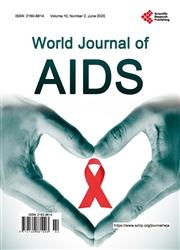Assessment of the Level of Knowledge, Attitude, and Practice with Regard to Care of People Living with HIV/AIDS among Nursing and Midwifery Students in Fako, Cameroon
引用次数: 7
Abstract
Due to the chronic shortage of health personnel, nurses and midwives now play a fundamental role in the care and treatment of people living with HIV/ AIDS (PLHIV) in Cameroon. This study was therefore designed to assess the level of knowledge, attitude and practice with regard to care of PLHIV among nursing and midwifery students in Fako division of Cameroon. A survey was performed between May and July 2015, among 227 nursing and midwifery students (in their second to final year of study), selected from 8 government accredited training institutions in Fako division of Cameroon. An anonymous self-administered semi-structured questionnaire was used to collect data. The Pearson’s chi-square test, univariate and multivariate logistic regression analyses adjusting for possible confounders were all performed as part of the statistical analyses. The cutoff of statistical significance was set at p ≤ 0.05. Nursing and midwifery students had a moderate level of HIV/AIDS knowledge (average score of 7.02 on a scale of 11). Attitude towards PLHIV was generally positive (68.7%) but there were some misconceptions and prejudice about PLHIV, with considerable stigmatization (31.3%), unwillingness to share a room with someone infected with HIV (27.7%), and unwillingness to work on PLHIV (23.8%). Good HIV/AIDS knowledge was observed to be the sole independent predictor (p = 0.004) of positive attitude towards PLHIV. Fur-thermore the confidence of the respondents regarding care of PLHIV was generally moderate. Our results suggest the need for the development of a more appropriate education program in nursing and midwifery institutions in Fako division to reduce the discrepancies between the general knowledge, attitude and practice regarding care of PLHIV.喀麦隆法科护理和助产学学生对艾滋病毒/艾滋病感染者护理的知识、态度和实践水平评估
由于保健人员长期短缺,护士和助产士现在在喀麦隆的艾滋病毒/艾滋病感染者的护理和治疗方面发挥着根本作用。因此,本研究旨在评估喀麦隆法科省护理和助产学学生对艾滋病毒感染者护理的知识、态度和实践水平。2015年5月至7月期间,对227名护理和助产学学生(二年级至最后一年)进行了一项调查,这些学生是从喀麦隆法科省8所政府认可的培训机构中挑选出来的。采用匿名自我管理的半结构化问卷收集数据。Pearson卡方检验、单变量和多变量逻辑回归分析均作为统计分析的一部分进行调整可能的混杂因素。统计学意义的截止值为p≤0.05。护理与助产专业学生对艾滋病知识的了解程度中等,平均得分为7.02分(满分为11分)。对艾滋病毒感染者的态度普遍为阳性(68.7%),但对艾滋病毒感染者存在一些误解和偏见,其中有相当程度的污名化(31.3%),不愿与艾滋病毒感染者合住(27.7%),不愿从事艾滋病毒感染者的工作(23.8%)。良好的HIV/AIDS知识是HIV阳性态度的唯一独立预测因子(p = 0.004)。此外,受访者对艾滋病毒感染者护理的信心总体上是中等的。我们的研究结果表明,需要在Fako区护理和助产机构制定更合适的教育计划,以减少对PLHIV护理的一般知识,态度和实践之间的差异。
本文章由计算机程序翻译,如有差异,请以英文原文为准。
求助全文
约1分钟内获得全文
求助全文

 求助内容:
求助内容: 应助结果提醒方式:
应助结果提醒方式:


